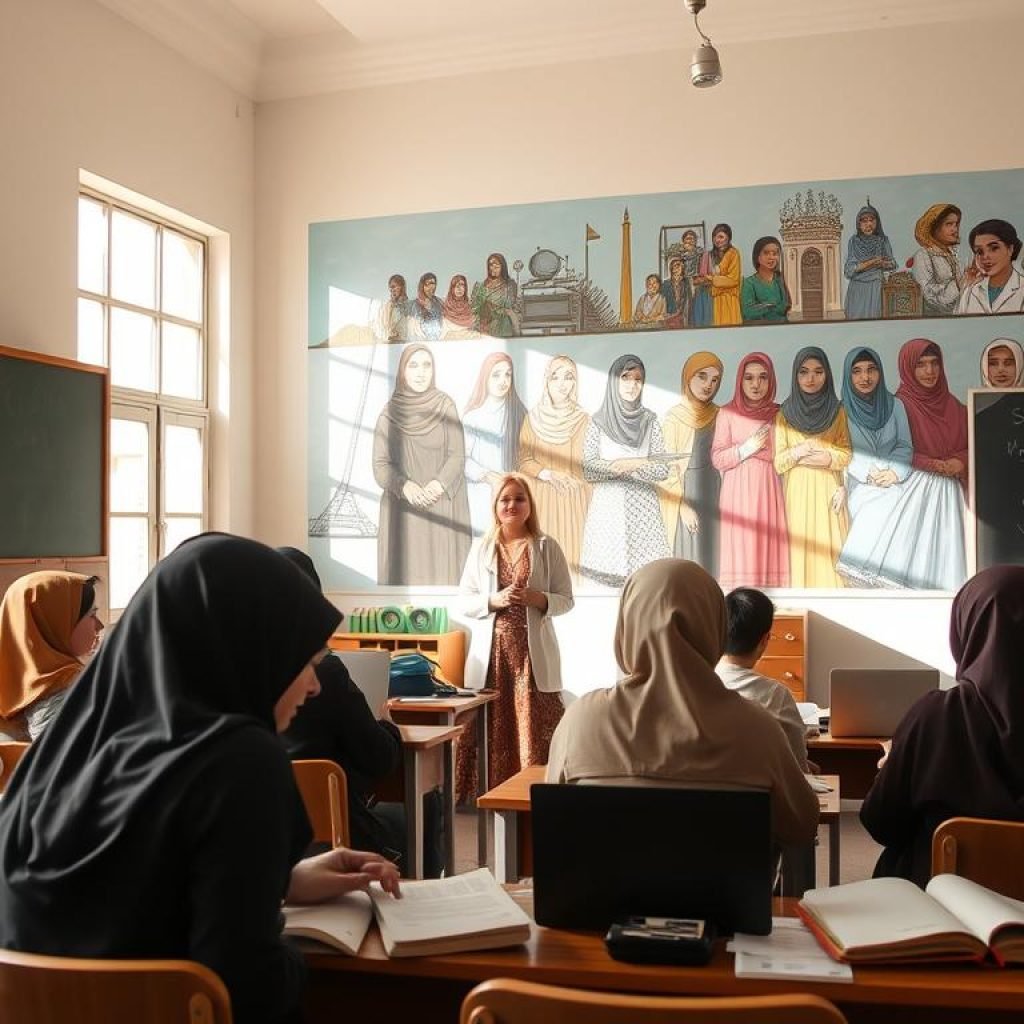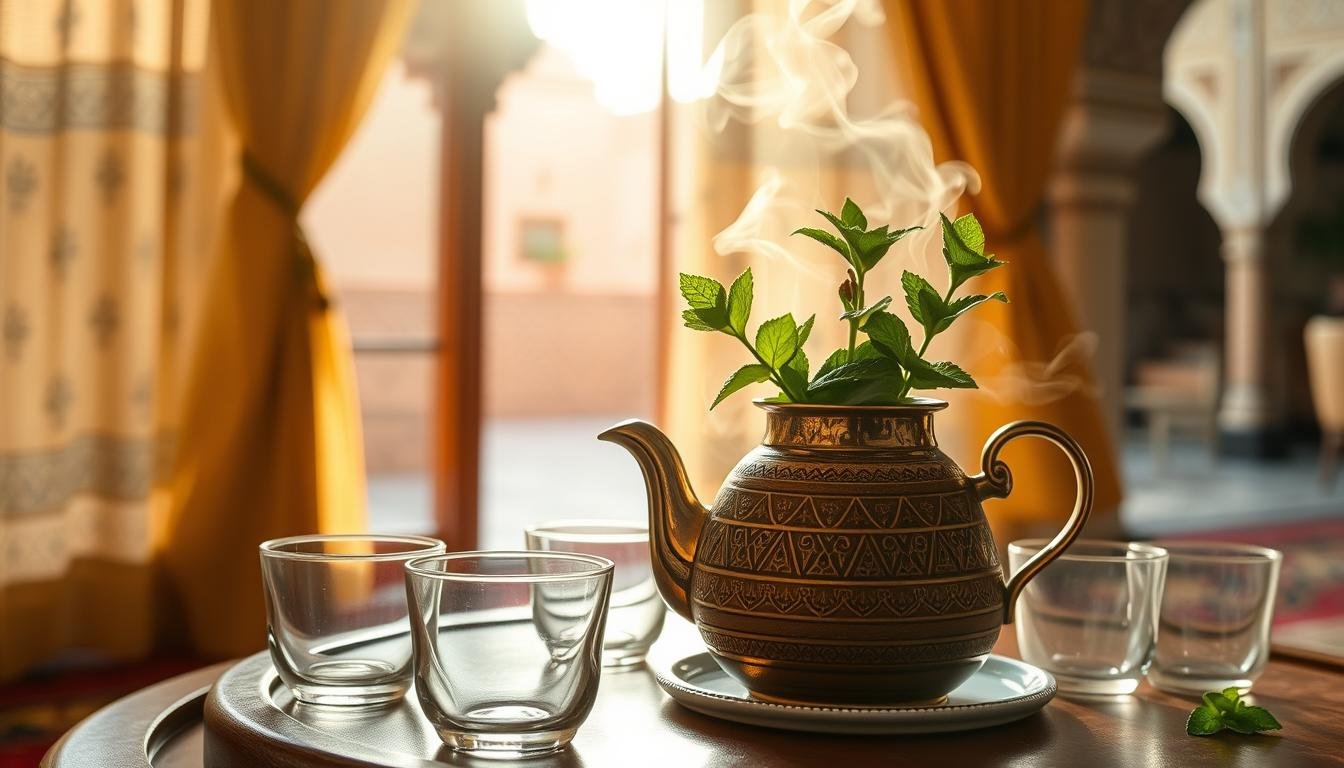What role does Moroccan mint tea play in shaping the lives of women in Moroccan society? How does it reflect the country’s rich cultural heritage and traditional gender roles? As we delve into the history of Moroccan mint tea, we’ll explore its significance in Moroccan culture and its impact on women’s rights in Morocco.
Moroccan mint tea has its roots in the 18th century. It has become a key part of the country’s social fabric. It influences the daily lives of women in Moroccan society and reflects the complex dynamics of gender roles. We’ll discover how it has been shaped by the country’s cultural and historical context, including the influence of colonialism and the integration of Morocco into global capitalist networks, which has had a profound impact on women’s rights in Morocco.
As we explore the cultural significance of Moroccan mint tea, we’ll also touch on the importance of women’s rights in Morocco. We’ll see how this traditional beverage reflects and shapes the experiences of women in Moroccan society, including their gender roles and cultural expectations.
Key Takeaways
- Moroccan mint tea has a rich cultural history dating back to the 18th century. Its significance extends beyond its role as a popular beverage. It reflects the complex dynamics of gender roles and women’s rights in Morocco.
- The tradition of Moroccan mint tea was introduced with the arrival of British “gunpowder tea.” It has since become an integral part of Moroccan social culture. It influences the daily lives of women in Moroccan society.
- Moroccan women have played a significant role in shaping the country’s cultural heritage. This includes the tradition of Moroccan mint tea. It reflects their importance in Moroccan society and their contributions to women’s rights in Morocco.
- The cultural significance of Moroccan mint tea is closely tied to the country’s traditional gender roles and women’s rights in Morocco. It highlights the complex dynamics of Moroccan society.
- As we explore the history and cultural significance of Moroccan mint tea, we’ll gain a deeper understanding. We’ll understand the complex dynamics of women’s rights in Morocco. We’ll see how this traditional beverage reflects and shapes the experiences of women in Moroccan society.
- Moroccan mint tea is not only a beloved beverage but also a symbol of hospitality and community. It reflects the importance of social bonds and cultural heritage in Moroccan society. It is particularly important in relation to women’s roles and gender norms.
- The tradition of Moroccan mint tea has been shaped by the country’s cultural and historical context. This includes the influence of colonialism and the integration of Morocco into global capitalist networks. It has had a profound impact on women’s rights in Morocco and the lives of women in Moroccan society.
History of Women’s Rights in Morocco
The journey of women’s rights in Morocco has seen steady progress. The 1970s and 1980s were key times. During this period, women started working in fields like education, health, and law. This was a big step towards female empowerment, as women became more influential in society.
Women’s associations were a big help in improving women’s rights. These groups pushed for women’s rights and helped with social and economic growth. The Akhawat Assafa association was set up in 1944, and the Progressive Union of Moroccan Women was founded in 1960.
Important moments in women’s rights in Morocco include the 2004 Moudawana (Family Law). It gave women new rights, like the right to self-guardianship and the right to divorce. The 2011 Constitution also made sure men and women are treated equally under the law. This move helped boost female empowerment and improved Moroccan women’s status.
Education and Women’s Empowerment
Education is key to empowering women in Morocco, closely tied to gender equality in Morocco. The country aims to close the gap in women’s education in Morocco. This is crucial for economic growth and social progress. Studies show that more female education can boost GDP by 0.37 percentage points.
More education means fewer children, more women working, and fewer deaths in infancy and motherhood. Educated women often marry later and better, leading to healthier families. The benefits of women’s education include:
- Improved health and prosperity for families
- Increased civic participation and political influence
- Enhanced economic benefits and social development

Empowering women through education and financial opportunities is vital for Morocco’s growth. Morocco leads in engineering graduates among women, beating many developed countries. Yet, only 22% of Moroccan women work in the formal sector. By focusing on women’s education in Morocco and gender gaps, the country can reach its full potential and achieve true gender equality in Morocco.
Traditional Gender Norms and Women’s Roles
In Morocco, old gender norms shape women’s roles and what’s expected of them. Women are usually seen as the ones who take care of the home. Men, on the other hand, are expected to earn money. This setup is deeply rooted in the culture, with men holding most of the power and women managing the household.
Recently, women in Morocco have started to challenge these norms by looking for jobs outside the home. But, they face many obstacles. These include not enough education and job chances. The idea of “harim” – a place for women to meet – is still common, showing the ongoing fight for women’s rights.
Some important facts about women’s challenges in Morocco are:
- High unemployment rates among women, with a notable disparity between urban and rural areas
- Limited access to microfinance initiatives, which can help women transition from the informal economy to the formal economy
- Ongoing social stigma surrounding women’s participation in the workforce, despite legal advancements
Despite these hurdles, there’s progress. The Moroccan government has made efforts to empower women. They’ve updated the Family Code to give women more rights. Also, groups like L’Association Démocratique des Femmes Marocaines and L’Union de L’Action Feminine are fighting for women’s rights and breaking down old gender norms.
Women’s Participation in the Workforce
Moroccan women are breaking barriers in the workforce. They are increasingly found in careers like education, health, and law. This rise in female empowerment is key to boosting the Moroccan women’s status in society.
Recent data shows women make up 60% of management graduates and 50% of science and technology graduates in 2021. This is a positive sign for women’s economic role.
A major step forward was Morocco’s Parliament passing a law in 2021. It requires at least 30% female representation on company boards by 2024. This move aims to boost women’s workforce participation and Moroccan women’s status. For more on Morocco’s push for women’s empowerment, check out Moroccan women’s rights.
Some important stats on women’s workforce participation are:
- 23% of Morocco’s working population are women
- 55% of high school graduates in Morocco are women
- Women make up 26% of the population with higher education

These numbers show progress in female empowerment and Moroccan women’s status. Yet, more work is needed to support women’s economic growth and opportunities.
Challenges Faced by Women in Morocco
Women in Morocco deal with many challenges. These include social and cultural barriers, economic issues, and limited access to education and jobs. These problems stem from traditional gender roles and what society expects from them. Even with progress since the 1960s, women face hurdles to get equal rights and chances.
Getting an education is a big challenge for women, especially in rural areas. About 78% of girls aged 12-14 in rural Morocco don’t go to school. Without education, they can’t join the workforce or make choices about their lives.
- Conservative mindsets that view women as inferior to men
- Legal discrimination that limits women’s initiatives and restricts progress
- Financial independence, with only 25% of women employed in the formal economy
- Sexual harassment and violence, including physical, psychological, and sexual forms
Despite these obstacles, there are steps being taken to fight for gender roles equality. The Moroccan Constitution supports gender equality. Laws like the Family Code, Labor Code, and Nationality Law have been updated thanks to women’s rights movements and global agreements.
Women’s Health and Well-being
Women’s health and well-being are key to their empowerment. Access to healthcare is vital for women’s rights in Morocco and gender equality in Morocco. Morocco has seen a big drop in maternal deaths, from 332 per 100,000 in 1992 to 72.6 per 100,000 in 2018.
But, there are still challenges. The neonatal death rate in 2018 was 13.58 per 1,000 live births. Also, only 70.8% of women use contraception. In 2018, 88.5% of pregnant women got prenatal care, and 86.6% of births were attended by skilled health workers.
The following table highlights some key statistics related to women’s health in Morocco:
| Indicator | Value |
|---|---|
| Maternal mortality ratio (2018) | 72.6 per 100,000 live births |
| Neonatal mortality rate (2018) | 13.58 per 1,000 live births |
| Contraceptive use rate (2018) | 70.8% |
| Antenatal health care coverage rate (2018) | 88.5% |
| Percentage of births attended by skilled health personnel (2018) | 86.6% |
These numbers show the need for more work to support women’s rights in Morocco and gender equality in Morocco. Especially in women’s health and well-being.
Women’s Representation in Politics and Media
Female empowerment is growing in Morocco, especially in politics. The number of women in the Moroccan Parliament has jumped from 2 in 1997 to 96 in 2021. This is thanks to a quota system introduced in 2002, which sets aside 90 seats for women.
Women’s presence in local councils has also grown. In 2003, there were 127 elected women. By 2009, this number had soared to 3,408. Yet, women still face hurdles in politics. For example, in 2021, only 6 out of 96 female deputies were elected locally. To help, the government has made changes like removing an electoral barrier and introducing a new voting method.
In the media, women’s voices are still quiet. A study found that 93% of voices on Moroccan news are men’s, while only 7% are women’s. Debate programs are even worse, with 88% of voices belonging to men and 12% to women. To boost female empowerment and improve the Moroccan women’s status, more women need to be seen and heard in media and politics.
Some important stats show the progress in Morocco:
- The number of women deputies in the Moroccan Parliament increased from 2 in 1997 to 96 in 2021.
- The representation of women at the communal level rose from 127 elected women in 2003 to 3,408 elected women in 2009.
- In 2021, the government appointed 5 women ministers, including the first female Minister of Economy and Finance.
Conclusion and Future Prospects
Looking back, we see how women’s education in Morocco has helped fight for gender equality. Despite ongoing hurdles, the country has made big steps forward. Over 75% of people think women’s status has gotten better.
Yet, traditional gender norms still hold women back, especially in rural areas. These norms are fueled by illiteracy and old-fashioned views. It’s vital to keep pushing for women’s education in Morocco and to challenge these outdated norms.
Several factors have helped improve women’s lives in Morocco. These include:
- More access to education
- Women in the workplace
- Support for women’s political rights
As Morocco keeps moving forward, it’s important to keep building on what’s been achieved. By supporting women’s education in Morocco and fighting against traditional gender norms, the country can become more equal. This will give women the chance to succeed on an equal footing.
Final Thoughts and Recommendations
Looking back, Morocco has made great strides in women’s rights. Empowering women and fighting for gender equality is crucial. The country has made big steps, but there’s still a lot to do to change gender roles and let women reach their full potential.
The changes to Morocco’s family law are a big step forward. But, we need more advocacy and laws to tackle ongoing inequalities. Groups like the Israr coalition have been key in pushing for these changes. They must keep leading the fight for equality.
To empower women in Morocco, we need a wide range of actions. We must improve education, create jobs, and break down social and cultural barriers. Together, we can create a fairer society that values women’s contributions in every area of life.




Comment (0)